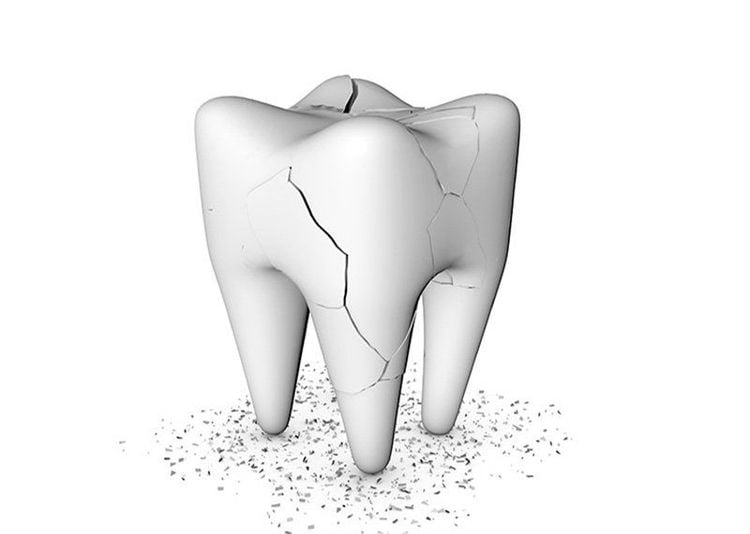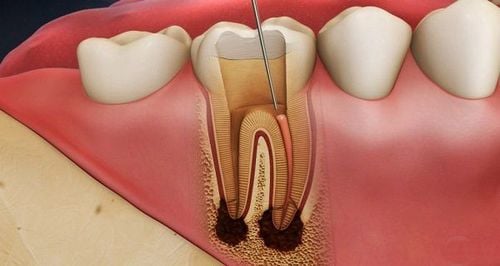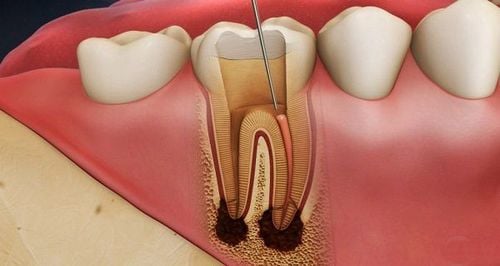This is an automatically translated article.
When the tooth pulp is infected, dentists are required to intervene by treating the tooth pulp, also known as root canal. Not all cases of tooth decay are indicated for root canal treatment. The warning signs listed below are intended to help patients recognize their condition and get the right treatment at the right time.
1. Root canal treatment
Root canal treatment is the name of a dental procedure that removes cavities in the pulp and roots of a tooth. Teeth are composed of an outer enamel layer, a second layer of dentin, and a soft inner core that extends to the root in the jawbone. The core contains the pulp, which includes nerves, blood vessels, and connective tissue.
When caries eat into the soft core, the pulp can become inflamed or infected, even necrotic (death). Root canal is needed to clean the tooth decay.
During a root canal procedure, your dentist will:
Remove bacteria and decay from the pulp, roots and nerves Disinfect the area with antibiotics Filling the empty roots Seal the area area to prevent caries from returning. Root canal treatment will preserve natural teeth and prevent further decay. But it makes teeth more fragile. That is why teeth with pulpitis are often crowned.
2. Symptoms you need root canal treatment
The only way to know for sure if you need root canal treatment is to see your dentist, but there are many warning signs. If the patient notices one of the following signs, visit the dentist as soon as possible, the earlier the treatment, the better the treatment outcome.2.1 Persistent toothache
Persistent toothache is one of the signs that you may need a root canal. The toothache can bother you all the time, or it can go away with time but always come back. The pain is deep in the bones of your teeth, or you have pain in your face, jaw, or other teeth.
Toothache can be caused by causes other than pulpitis, like some of the other possibilities below:
Gum disease Toothache Pain caused by sinusitis or other infections Broken fillings Infected deviated teeth .

Đau răng dai dẳng là một trong những dấu hiệu cho thấy bạn có thể cần điều trị tủy răng.
2.2 Teeth are sensitive to heat and cold
Sensitivity can make you feel like a dull ache or a sharp pain when eating cold or hot food. You may need a root canal if this pain persists for a long time, even if you stop eating or drinking.
This could be a sign that the blood vessels and nerves in your teeth are infected or damaged.
2.3 Change of tooth color
A pulp infection can cause your teeth to become discolored. Trauma to the tooth or disruption of the inner tissue can damage the root and give the tooth a grayish-black color, this discoloration is more noticeable in the front (anterior) teeth. Parts of the tooth can die when the blood supply is insufficient, thus signaling the possibility that a root canal is needed.
Although tooth discoloration can be caused by other causes, you should see your dentist if you notice that your teeth are discolored.
2.4 Swollen gums
Swollen gums near the painful tooth can be a sign that the tooth needs root canal treatment. Swollen gums may be recurrent, painful, or painless to the touch. Gum swelling is caused by acidic waste products from dead pulp tissue, resulting in swelling beyond the apex.
You may also see small bumps on the gums, called gingival boils, boils, or gum abscesses. Pimples can drain from an infection in your teeth, which can cause a strange taste in your mouth and make your breath smell bad.
2.5 Pain when chewing or touching teeth
If your teeth are sensitive to the touch or when chewing, it could be a sign of serious decay or nerve damage, which may need to be treated with a root canal.2.6 Chipped or cracked teeth
If you chip or crack your tooth by accident, during a contact sport, or from chewing on something hard, bacteria can enter and lead to inflammation and infection.
Even if you injure a tooth, but it doesn't chip or crack, the injury can still damage the tooth's nerves. Inflamed nerves can be painful and sensitive, and may require root canal treatment.

Nếu bạn bị mẻ hoặc nứt răng, vi khuẩn có thể xâm nhập, dẫn đến viêm và nhiễm trùng
2.7 Loose teeth
Tooth infections can cause loose teeth. This can be caused by factors other than pulp necrosis, but it can be an indication that a root canal is needed. The acidic waste from the dead nerve can soften the bone around the dying tooth's roots, causing looseness.
If the patient has more than one loose tooth, it is likely something other than the problem that may require a root canal.
3. Is root canal treatment painful?
Root canal procedure sounds scary, but with today's technology, it's usually not much different from a deep filling. There is little or no pain as your dentist will give you a local anesthetic to numb your teeth and gums so that you are comfortable during the procedure. If you need a root canal and have facial swelling or a fever, your dentist may prescribe antibiotics first to kill the infection. This can also help relieve pain.
The root canal procedure itself is similar to that of a large filling, but it takes longer. Your mouth will be numbed while the dentist cleans the cavity, disinfects the root, and then fills it.
The dentist uses a rubber dam around the tooth as the pulp, to prevent any infected part from spreading to the rest of the mouth.
You may feel pain after the root canal. You can take an over-the-counter pain reliever such as acetaminophen or ibuprofen as directed by your doctor.
4. How to minimize root canal treatment
To minimize root canal treatment, it is important to follow good oral hygiene habits to help prevent cavities and other dental problems. To keep your teeth healthy, try to get in the habit of following these steps:
Brush your teeth properly at least twice a day. Floss properly to clean between your teeth every day. Use a fluoride toothpaste or a fluoride mouthwash. Visit your Dentist for a dental check-up every 6 months. Have your teeth professionally cleaned by your dentist at least once a year. Try to limit the amount of sugary foods and refined carbohydrates you eat. These foods tend to stick to the teeth. If you eat sugary foods, try to rinse your mouth or brush your teeth right after.

Tuân thủ các thói quen vệ sinh răng miệng để giúp ngăn ngừa sâu răng và các vấn đề về răng khác
5. After root canal treatment, will the patient still feel pain?
Some of the causes of this pain can be:
The root canal is not healing properly The root canal is not completely disinfected because of the complicated root anatomy New decay can infect the root canal filling material, causing new infections Injuries give new cavities a chance to enter the tooth According to the American Dental Association - AAE, re-treatment - that is, taking another root - is the best option for treating pain and any other problems. any other symptoms.
Root canal treatment or root canal treatment is one of the difficult and complicated procedures in dental practice. To avoid complications after root canal treatment requires a dentist with good expertise and broad knowledge.
Currently, the Department of Odonto-Stomatology at Vinmec International General Hospital is applying the technique of root canal treatment and sealing of the root canal system with cold Gutta percha using rotating file, root canal treatment is a technique that can However, treatment with a machine file has only been around for a few years, and Vinmec always approaches new technologies to aim for the best oral health care for everyone.
When choosing root canal treatment at Vinmec International General Hospital, patients will be examined and treated by a team of experienced and highly specialized doctors, with the support of a system of specialized machines. Modern department, absolutely sterile.
Please dial HOTLINE for more information or register for an appointment HERE. Download MyVinmec app to make appointments faster and to manage your bookings easily.
Reference source: Healthline












